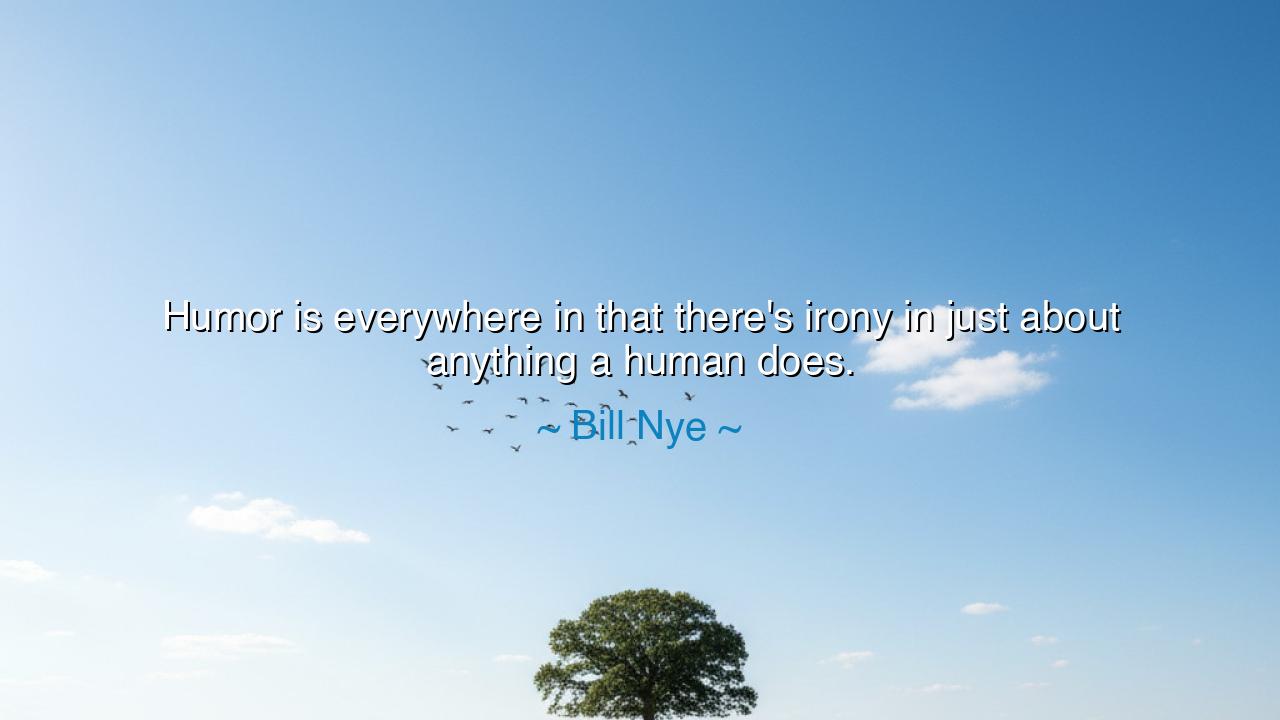
Humor is everywhere in that there's irony in just about anything






Hearken, children of the ages, and attend the wisdom of Bill Nye, who observed: “Humor is everywhere in that there’s irony in just about anything a human does.” Consider this truth: the human condition, in all its grandeur and folly, is woven with contradictions, paradoxes, and unexpected outcomes. In the missteps of kings, the pride of philosophers, and the endeavors of common men, there lies subtle humor, born of the dissonance between intention and reality. Where there is humanity, there is irony, and where there is irony, there is laughter—waiting to be recognized by those who see beyond mere appearance.
In the ancient courts of Athens, the poets and dramatists knew this well. Aristophanes, whose plays mocked the follies of statesmen and citizens alike, revealed that every human act contains the seeds of irony. The pursuit of honor, wealth, or wisdom often yields outcomes contrary to intention, and in this reversal lies the spark of humor. By observing human action closely, one perceives the absurdity, the contradiction, and the lesson, wrapped together in a single moment of revelation.
Consider the life of Abraham Lincoln, a man who faced the burdens of personal grief and a nation at war. He often employed humor not merely for amusement, but to illuminate the ironies of human behavior. In observing the follies of politicians, the contradictions in social customs, or even the idiosyncrasies of his own nature, Lincoln demonstrated that humor is a lens through which the heart and mind may comprehend the complexities of life with grace and patience.
Even in literature, the omnipresence of irony manifests as both delight and instruction. Mark Twain, whose pen immortalized the contradictions of society, observed that the ambitions of men often yield outcomes opposite to their desires. His tales, suffused with humor, remind us that life’s great absurdities are not accidents, but reflections of human nature itself. To see this is to see life clearly: to laugh is to recognize the eternal dance between intention and consequence.
History offers yet another illustration in the life of Charlie Chaplin. In his films, human aspiration, pride, and struggle are constantly juxtaposed with unexpected outcomes. The Tramp slips, stumbles, and confronts absurdity at every turn. Through these portrayals, audiences recognize the irony inherent in all human endeavor, and laughter arises not from mockery alone, but from the recognition of truth. Chaplin’s genius lay in making humor universal, revealing it wherever human contradiction walked.
Yet, the lesson of Nye’s insight is subtle: humor is not merely amusement, nor is irony a tool of scorn. They are instruments of perception. To observe the irony in human actions is to cultivate understanding, patience, and humility. It allows the mind to see beyond rigid expectation, to embrace uncertainty, and to find grace in the inevitable missteps that mark mortal life.
Children of the ages, the teaching is clear: open your eyes to the omnipresent irony of human existence. Observe actions, intentions, and outcomes with care, and allow the recognition of these contradictions to inspire gentle laughter. In doing so, you cultivate a heart both wise and light, capable of enduring folly without judgment, and capable of finding joy in the unlikeliest of moments.
Practical action follows naturally. Watch life with keen attention, noting where ambition clashes with reality, pride meets consequence, or desire yields paradox. Share stories that reveal these ironies with others, laugh at your own missteps, and cultivate a daily awareness that humor is everywhere. In this way, as Bill Nye teaches, the world becomes a canvas of insight and amusement, where every human action carries the hidden light of laughter and understanding.






AAdministratorAdministrator
Welcome, honored guests. Please leave a comment, we will respond soon